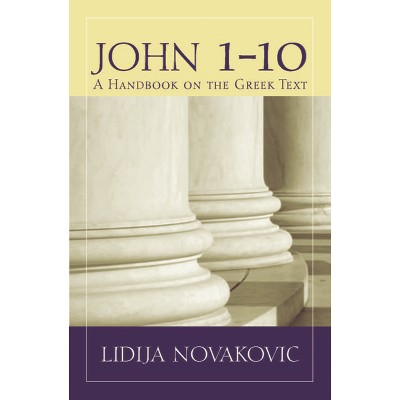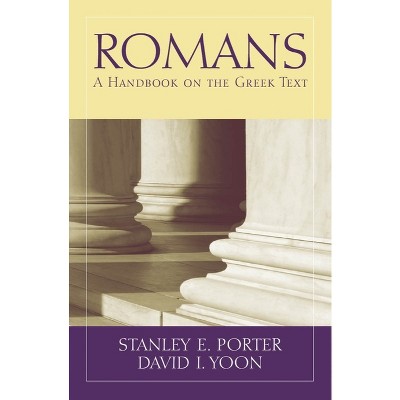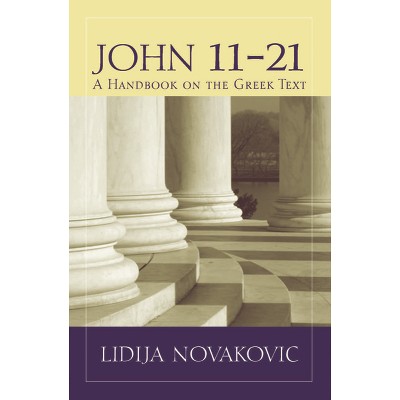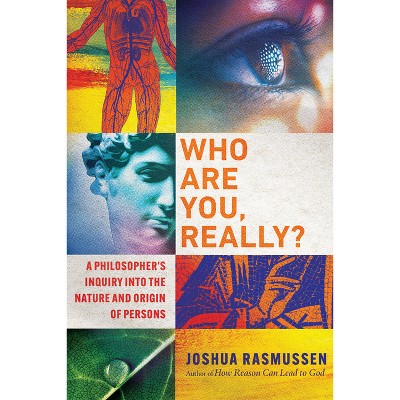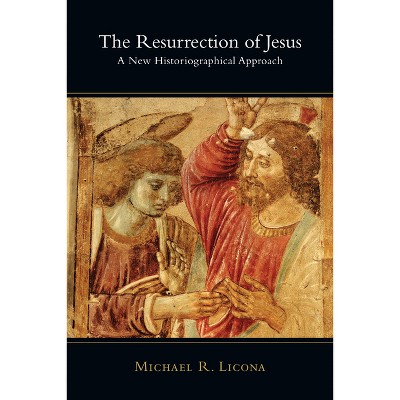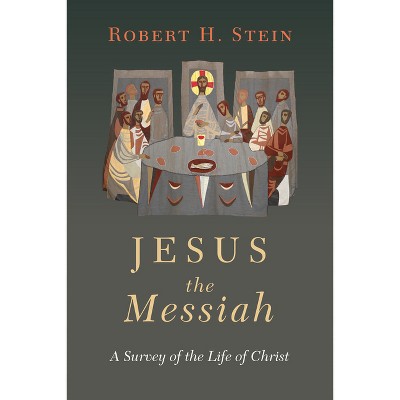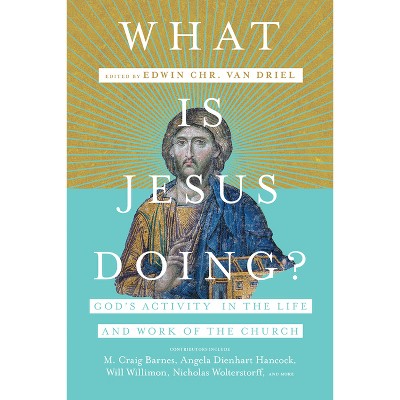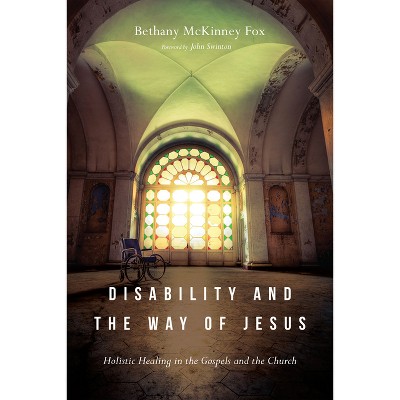Sponsored

Did Jesus Really Say He Was God? - by Mikel del Rosario (Paperback)
In Stock
Sponsored
About this item
Highlights
- How to Make Sense of Jesus' Divine ClaimsDo you ever wonder if Jesus really claimed to be God?
- About the Author: Mikel Del Rosario (PhD, Dallas Theological Seminary) is professor of Bible and theology at Moody Bible Institute in Chicago.
- 256 Pages
- Religion + Beliefs, Christian Theology
Description
About the Book
"Do you ever wonder if Jesus really claimed to be God? Maybe you've heard people say, 'Jesus never said he was God,' or you've been asked, 'Why believe Jesus is divine if he never claimed it?' These challenges aren't just from non-Christians--they show up in church, too. Even if you're not coming from a place of skepticism, you might still question how well church teachings about Jesus match up with what he actually said. So, did the historical Jesus really claim to be divine? This book is here to give you confidence in the historicity of Jesus' claim to divinity"Book Synopsis
How to Make Sense of Jesus' Divine Claims
Do you ever wonder if Jesus really claimed to be God? Maybe you've heard people say, "Jesus never said he was God," or you've been asked, "Why believe Jesus is divine if he never claimed it?" These challenges aren't just from non-Christians--they show up in church, too. Even if you're not coming from a place of skepticism, you might still question how well church teachings about Jesus match up with what he actually said. So, did the historical Jesus really claim to be divine?
This book is here to give you confidence in the historicity of Jesus' claim to divinity. It's designed to help you explain your faith in a world that increasingly doubts the Bible's portrayal of Jesus. Instead of focusing on what Jesus' followers believed, this book takes a different approach--it looks at what Jesus' enemies thought. How did they interpret his words and actions? Their perspective can help you understand the historical validity of Jesus' divine claim.
In this book, biblical scholar Mikel Del Rosario
- uses historiography to examine claims about Jesus' divinity,
- analyzes ancient Greco-Roman, Jewish, and biblical sources to understand how Jesus' words and actions were interpreted by his adversaries and followers, and
- argues that Jesus claimed divine authority, a claim supported by strong historical evidence.
If you're a Christian, this book will equip you to defend your faith against theories that suggest Jesus only claimed human authority, not divine. If you're someone who sees Christianity differently, this book offers a serious investigation into the claims of the historical Jesus, providing evidence that any theory of his identity must address. Whether you're searching for answers to your own questions or trying to share about Jesus with others, this book will help you communicate Jesus' divine claim with clarity and confidence.
Review Quotes
"'Who is Jesus?' is a good question. But 'Who did Jesus say he was?' is even better. In this book, Mikel Del Rosario probes that very question with historical acumen and intellectual verve. He explores the biggest question of them all: Did the man Jesus of Nazareth claim to be a divine person? Not just a prophet, king, or a miracle-worker, but the personal expression of the God of Israel? Mikel gives an answer that is well-reasoned, convincing, and--some may even find--startling. An amazing exploration of a fascinating subject."
--Michael F. Bird, deputy principal at Ridley College in Melbourne, Australia"Astute and insightful, clear and compelling, here's a thoroughly historical case for Jesus claiming to be the unique Son of God. In an age when skeptics dispute his outrageous assertion, this is a powerful antidote that sets the record straight. Indeed, Jesus not only asserted that he is divine, but he ultimately demonstrated it by returning from the dead!"
--Lee Strobel, author of Seeing the Supernatural"Claiming to be a prophet speaking on behalf of God is an audacious claim. But such pales in comparison to claiming to be God! Although Jesus is not reported to have ever said 'I am God, ' the Gospels portray him as claiming things about himself that are virtual equivalents. But did he actually say these things? This is one of the most important questions one can ask. In this volume, Mikel Del Rosario answers yes, combining solid historical scholarship with an accessible presentation. This excellent investigation will equip you with key talking points for discussing Jesus' divinity with others."
--Michael Licona, professor of New Testament Studies at Houston Christian University"Few major Christian doctrines are challenged more frequently by critics today than the deity of Jesus. Defenses of this teaching, as an indispensable portion of the gospel message, are absolutely crucial. Beyond the comments from Jesus and the teachings from the key epistles, Mikel Del Rosario also examines historiographical data from Greco-Roman sources, as well as what Jesus' enemies thought about him. Together, these avenues combine to present the forceful case for the New Testament claims regarding Jesus's Christology."
--Gary R. Habermas, distinguished research professor at Liberty University"Mikel Del Rosario's Did Jesus Really Say He Was God? uses traditional, widely accepted, academic historical research methodology to make a solid argument that the Jesus of Nazareth who lived in the first century CE claimed to be God. This work needs to be standard reading for undergraduate and graduate students confronted by classroom proposals to the contrary. The faithful believer will be strengthened to face counterarguments, and the skeptic will be challenged to consider weaknesses in positions that deny Jesus' claim to deity. I am very encouraged by this work."
--Eric C. Redmond, professor of Bible at Moody Theological Seminary"The deity of Jesus is not a secondary issue for Christians. Whether Jesus was or was not, claimed or did not claim divine status, all sits at the heart of historical and biblical Christian thought and practice. Mikel Del Rosario's comprehensive and historical approach provides the reader with the necessities of navigating the issue of Christology. This volume provides the reader with the data necessary to assess the issue properly, and ultimately, delineate the truth concerning who Jesus of Nazareth really was."
--Wesley Huff, vice president of Apologetics Canada"This is a multifaceted book that concisely accomplishes several tasks. Not only does it inform readers, but it does so in an entertaining way that also equips. Readers are introduced to historical methods as well as different positions taken by scholars regarding the question 'Who is Jesus?' Readers will learn some common objections to the traditional portrait of Jesus (and some lesser-known ones) and the historical pitfalls or challenges that confront such portraits. Throughout the book, Mikel Del Rosario works to provide the reader with the information in such a way that allows them to be better prepared and more confident to discuss what the New Testament says about Jesus."
--Ben Shaw, president of CORE Apologetics, adjunct professor at Liberty University, and author of Trustworthy"This is a unique, timely, and important book. Mikel Del Rosario defends the vital doctrine of the deity of Jesus but does so in a remarkably systematic and careful way. He lays out his historical methodology, applies it to two key texts in the Gospel of Mark, and then responds to leading critics. This is not only a wonderful defense of the deity of Jesus but a model for how to do historical Jesus scholarship."
--Sean McDowell, professor of apologetics at the Talbot School of Theology, author of The Fate of the Apostles, and YouTuberAbout the Author
Mikel Del Rosario (PhD, Dallas Theological Seminary) is professor of Bible and theology at Moody Bible Institute in Chicago. He has coauthored thirty-one journal articles on apologetics and cultural engagement in Bibliotheca Sacra with his mentor, Darrell L. Bock. A member of the Evangelical Theological Society, Del Rosario is host of The Apologetics Guy Show, a podcast on YouTube and the Christianity Today Network. He previously hosted Dallas Theological Seminary's cultural engagement podcast, The Table. He enjoys living with his wife in Chicago.
Shipping details
Return details
Frequently bought together






